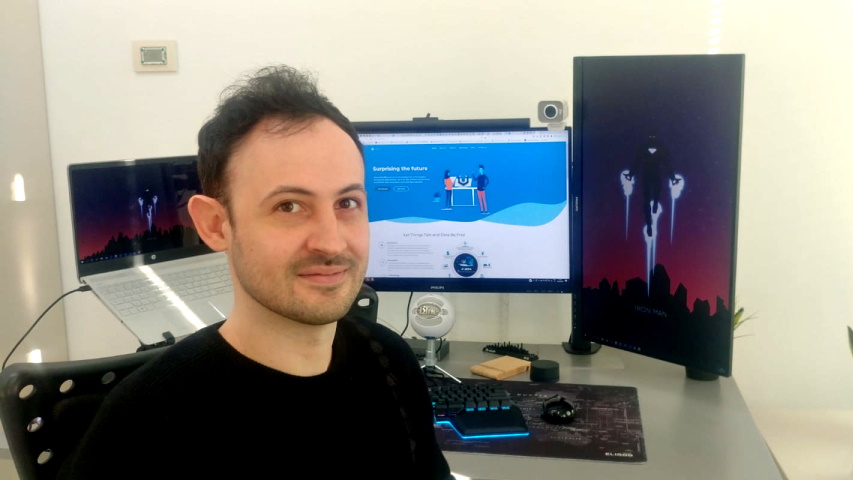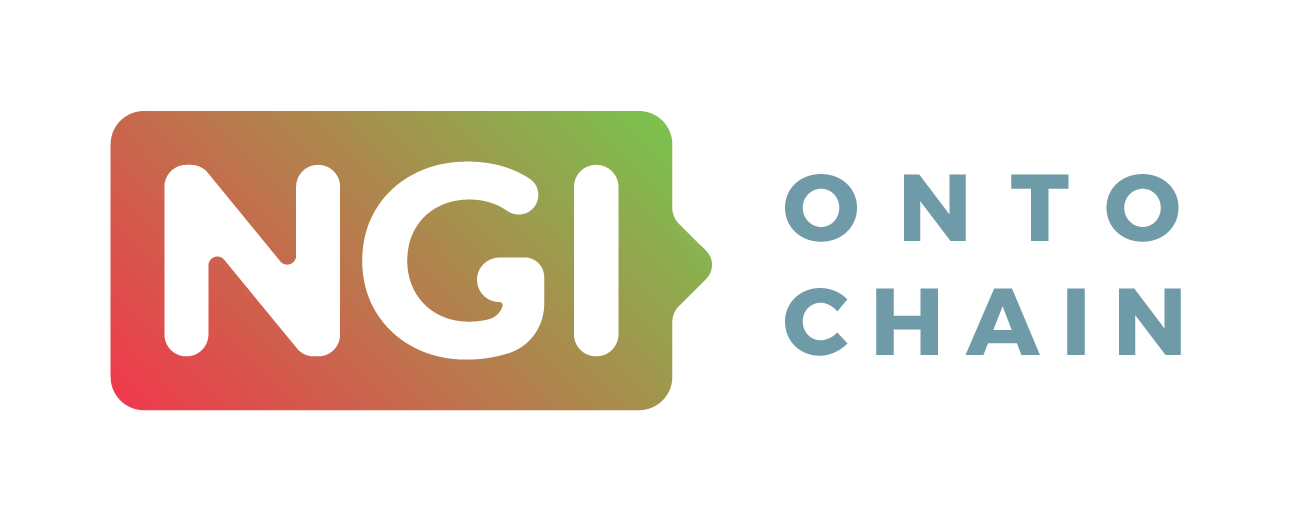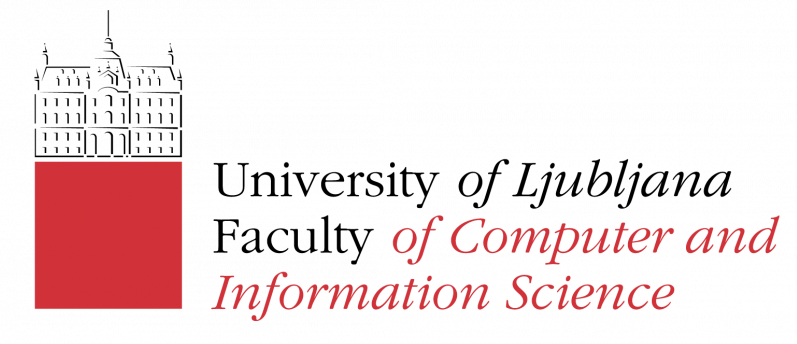DESMO-LD team was inspired by the fact that nowadays, most oracle solutions are not built to handle heterogeneous and distributed data sources coming from the IoT. So, how can we trust the data?
Learn in this interview with Cristiano Aguzzi more about the story behind their innovative distributed oracle that is heavily employing Web of Things technologies.

How did you hear about ONTOCHAIN and what drove you to apply?
Word of mouth. My brother is doing a computer science Ph.D. course and in June he attended DisCoTec 2021, a conference about distributed computing techniques. There he listened to a talk where the speaker advertised a new initiative about semantics technologies applied to the blockchain. Knowing my research interests, my brother promptly messaged me with a link to the ONTOCHAIN initiative. After discussing with my partners in crime Luca Roffia and Lorenzo Gigli, we decided to apply mostly for these three reasons:
- Our research has always been around Semantic Web technologies and their application on different domains. We found the ONTOCHAIN scopes and goals really in line to our ideas about the advantages of machine understandable metadata applied to blockchain technologies.
- We were already working inside another NGI funded project and we were enjoying the enthusiasm and the connections that we felt working there.
- We liked the idea to move out of our comfort zone and embrace the new paradigm shift of the blockchain technologies.
Tell us a bit about the story behind your team. What drives you and what brought you together?
We started as a small team of just Luca and me, but soon, we grew up as new students, industrial partners, and researchers joined our company. In VAIMEE, we are bound by the passion for research in computer science and the belief that semantic technologies can still make a difference in software quality and extensibility. Moreover, we do not forget there is a strong connection between the physical and virtual worlds, where humans play the main role. Therefore, we look for interesting projects with practical, positive, and meaningful implications for everyone.
Can you briefly explain your project and its contribution to the ONTOCHAIN software ecosystem?
Nowadays, most oracle solutions are not built to handle heterogeneous and distributed data sources coming from the IoT. Nonetheless, the very nature of trustiness lies into the ability of verify the same piece of information from different data source at the same time. In a nutshell, there is a higher probability that a value is right if different parties agree on the same result.
The DESMO-LD project aims to provide a fully integrated distributed solution for consuming IoT external data, enriched with Web of Things semantics and data model, inside the ONTOCHAIN. This addresses the call's objectives of designing new trustful decentralized Oracles to pull semantic data from off-chain data sources. Besides, DESMO-LD introduces novel strategies to achieve the above goals with the heavy deployment of standard ontology and semantic oriented algorithms for data quality and trustiness.
How did you come up with this idea? What’s unique about it? And what will be the end user benefits?
We started from the state of the art: being researchers, we did our best to understand what the current landscape of data oracles was. We noticed that most data oracles cannot handle heterogeneous and distributed data sources, and there are not many solutions focused on IoT data. Nonetheless, IoT data is a key enabler for innovative smart contract applications. Moreover, we are experts on the novel IoT standard of the Web of Things that aims to uniformize the various IoT platform under the same paradigm. We thought that combining WoT semantics in a distributed oracle application would solve the abovementioned problems. Here is where DESMO-LD was born.
About the peculiarities of our solution, at the best of our knowledge, it is the first distributed oracle that is heavily employing Web of Things technologies. Moreover, it features a ranking system able to assess data sources' quality to de-incentives bad or unfair behaviour. Finally, the oracle is built to ingest and query decentralized data sources held by third parties. In practice, we incentivize the participation of everybody in building a wide web of connected devices queryable by smart contracts.
You are contributing to ONTOCHAIN’s mission of delivering a new software ecosystem for trusted, traceable & transparent ontological knowledge. How is ONTOCHAIN contributing to your own ambitions?
We are really grateful to be part of this great group of talented individuals all contributing to the vision of NGI. Being outsiders of the blockchain community, ONTOCHAIN gave us the opportunity of creating new synergies with relevant partners. Not to mention the actual funding contribution that allowed us to explore an idea that was outside of our regular business plan. Finally, as we experienced during NGI DASPI, these initiatives open the possibility for small startups like us to outreach to bigger players and partners inside the European region and beyond.
How do you assess the experience of working with other teams in the co-creation of the ONTOCHAIN ecosystem? What type of synergies do you want to explore?
From the very beginning, the ONTOCHAIN programme promoted a collaborative environment. Every team is very open to discussion and collaboration. Overall, we are enjoying this continuous stream of ideas and teamwork. Currently, we are exploring different synergies:
- CareChain - Represents one of our target use cases. We discussed possible ideas to connect with them. It will be crucial to satisfy their needs in our on-chain APIs to allow micro-insurance contracts to access IoT data.
- ADOS - With ADOS we share the same goal: provide verified and good quality IoT data. Synergies may involve technical support or use case analysis.
- Ontospace - Ontospace is looking for an efficient way to query RDF data from smart contracts. In DESMO-LD we are designing a similar efficient query mechanism to select interesting devices.
- DKG - DKG may serve as a long-term distributed semantically enriched database of IoT data collected through our oracles system.
- iExec - Our oracle Distributed application is built within the iExec distributed computing platform, making iExec one of our key partners in the ONTOCHAIN program.
What are your expectations regarding the new software ecosystem that ONTOCHAIN will deliver and its contribution to the NGI priority areas?
We believe that the ONTOCHAIN is going to play a crucial role in the future of the internet. We expect that smart contracts will have an increased demand for trustable and good-quality IoT data; the ONTOCHAIN will be an affordable and democratic means to cover their needs. Regarding NGI priority areas, ONTOCHAIN fits perfectly the Decentralisation and trust area: thanks to public blockchain technologies, the ONTOCHAIN will be decentralized by design. Inclusion and security are also core design principles of every ONTOCHAIN project adding another priority area covered by this initiative.

 This project has received funding from the European Union’s Horizon 2020 research and innovation programme under grant agreement No 957338
This project has received funding from the European Union’s Horizon 2020 research and innovation programme under grant agreement No 957338




